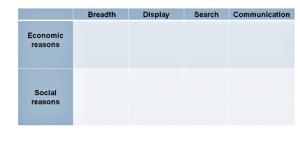
Are social platforms an adequate solution for social failures?
When Prof. Ralf Wagner and I started to plan the course “Social Media Management” at the RFH Köln, Ralf introduced me to the ideas of Prof. Mikolaj “Misiek” Piskorski (former Harvard University, now IMD Lausanne). Prof. Piskorski developed the systematic of “social failures” which occur in the offline world and which social platforms try to solve (see: Piskorski, 2011, 2014).
“There are many interactions in the offline world that we would like to undertake but cannot. These missing interactions represent unmet social needs, or social failures. In some cases, these social failures relate to inability to meet new people – I will refer to these as ‘meet’ failures. In other cases, they pertain to the inability to share private information or social support within the context of existing relationships – I will refer to them as ‘friend’ failures. These failures lie at the heart of why people are attracted to social platforms.” (Piskorski, 2014)
Piskorski’s premises are based upon the idea that social deficits can be solved by social platforms (social solutions) – the main challenge for a platform is to do it appropriately considering the intended target group. The author introduces a four-dimension framework which represents main reasons creating social failures: breadth, display, search, and communication.
Let’s illustrate this with two examples (see: Piskorski, 2014): eHarmony solves (or at least tries to do so) the abovementioned four reasons for social failures by attracting many members to their website (breadth), knowing a lot of personal information (especially marriage-related issues) about these members by using a comprehensive questionnaire (display), connects them with other members who are, based upon the compiled information, probably a good “match” (search) and helps them to communicate, either via a feature called “Guided Communication” or alternatively via an open chat function (communication).
Another example may be Tinder: This service attracts a huge amount of members (breadth), allowing members to present themselves by creating an account (and using their Facebook profile respectively, display), presenting other members in the nearby area (search) and offering the possibility to get in touch with these members after matching (communication).
Some platforms solve these issues better than others, obviously. While I have to admit that Piskorski’s concept is really profound – actually by far the best we have found so far – and his four dimensions are covering numerous reasons for social failures, he admits that social plattforms can also increase or create new types of social failures. He calls these “derivative costs”. Considering these derivative costs there is still a lot of potential for academic research. In this context, there are two questions that are in my mind:
- Do situations exist when social platforms are increasing social failures (thus failing to solve failures, even worsening them or creating new problems)?
- Are social platforms per se able to solve every kind of social failure?
I, therefore, argue that there are two issues:
A. Social platforms can increase or create (new) social problems
There is evidence that social platforms have the potential to create envy and jealousy in a romantic relationship or among friends as well as cybermobbing (examples for research in relation to these topics include Krasnova, Wenninger, Widjaja, & Buxmann, 2013; Muise, Christofides, & Desmarais, 2009). Thus, do social platforms make more couple split because they can “stalk” each other, thus arousing more envy? Do they offer more possibilities for bullies? What about the enhanced anonymity in this context? Web 2.0 probably offers a “mouthpiece” for hate speeches and opinions which should not find its way into the public.
Wilson, Graham, & Gosling (2012) as well as Anderson, Fagan, Woodnutt, & Chamorro-Premuzic (2012) already collected an impressing amount of scientific reasearch covering these topics, but there is still some research needed in this field, especially in combination with Piskorski’s framework.
B. Psychological, personal problems that social platforms cannot solve
Considering social relationships life knows countless ways to break our hearts, both from a friendship and of course from a romantic perspective. In my opinion, there exist psychological, personal problems that are creating social failures which no machines, algorithms and platforms can solve, as the human mind of each individual personality is (too?) complex.
An example: A social platform helps two people, who have just split up from a previous relationship, to get to know each other. After having some really nice conversations on- and maybe also offline, one of them realizes the experiences of the previous relationship still hurt too much and he or she is not yet ready to open up. The tragic result is (new) heartbreak for at least one of them.
This example actually kind of covers both abovementioned issues (A and B): Do social platforms increase or create social failures by not being able to overcome psychological, personal problems? Well, actually, you can’t blame the platform on offering additional opportunities to get to know new people and probable love affairs. This kind of heartbreak could also have happened the same way if these people got in contact first in the offline world, e.g. in a public space like a bar. The personal problems that one of these persons has and which create the (romantic) interaction between both of them not to happen is not the fault of the social platform. But you have to admit it does not help in solving the mentioned personal problems that occur in the offline world either. Yet, the following, rather philosophical question remains: Would these two people have been better off, if their (in the end failed) social interaction, that has been initiated by the social platform, would not have happened in the first place?
As mentioned before, there do already exist several studies analyzing both negative and positive influences of social platforms on social interactions but there surely is more space for academic research here. It would be especially interesting to see if these studies (or new aspects) can be linked to Piskorki’s framework in order to see, how well the four dimensions are actually able to solve social failures.
References
Anderson, B., Fagan, P., Woodnutt, T., & Chamorro-Premuzic, T. (2012). Facebook psychology: Popular questions answered by research. Psychology of Popular Media Culture, 1(1), 23–37.
Krasnova, H., Wenninger, H., Widjaja, T., & Buxmann, P. (2013). Envy on Facebook: A Hidden Threat to Users’ Life Satisfaction? Wirtschaftsinformatik Proceedings 2013.
Muise, A., Christofides, E., & Desmarais, S. (2009). More Information than You Ever Wanted: Does Facebook Bring Out the Green-Eyed Monster of Jealousy? CyberPsychology & Behavior CyberPsychology & Behavior, 12(4), 441–444.
Piskorski, M. (2011). Social Strategies That Work. Retrieved March 25, 2016, from https://hbr.org/2011/11/social-strategies-that-work.
Piskorski, M. (2014). A social strategy: How we profit from social media. Princeton u. Oxford: Princeton University Press.
Wilson, R., Graham, L., & Gosling, S. (2012). A Review of Facebook Research in the Social Sciences. Perspectives on Psychological Science, 7(3), 203–220.

